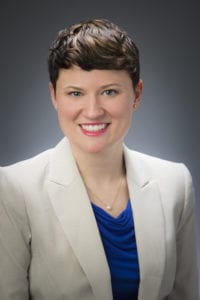Wellness Perspectives from the SGO 2021 Annual Meeting | Monica Vetter, MD

Monica Vetter, MD
It’s certainly an understatement to describe the past year as a challenge. From dealing with an unprecedented global pandemic to witnessing the consequences of rampant racial inequities and racism still present in this country, the past year challenged all of us in new ways. A year’s pause from the Annual Meeting also affected our professional engagement and support. Despite the switch to a virtual platform in 2021, the sessions were jam-packed with incredible and impactful information.
The Wellness session was no exception. Caitlin Carr, MD, presented on the impact of the COVID-19 pandemic on SGO members. Dr. Carr found that while there was no independent association with COVID-19 related demographics, approximately 40% of SGO members were experiencing burnout, with 61% members reporting acute stress symptoms. Additionally, more than 50% of all respondents reported at least moderate levels of stress regarding COVID-19 work factors.
The abstract presentations were followed by three breakout sessions. The first session was on Diversity, Inclusion, and Wellness by Sarahn Wheeler, MD. She gave an impactful presentation on the etiologies of health care inequities, and how we can use wellness and other practical skills to foster diversity and inclusion. Session 2 by Erika Rangel, MD, focused on the challenges facing parents and those planning to conceive, and offered practical tips on how to better manage work-life balance. The final session by Amy Cooper, MD focused on the second victim phenomenon, which occurs when a health care provider experiences a poor outcome, unanticipated adverse event, medical error and/or patient-related injury. Dr. Cooper shared her own experiences and discussed strategies of mitigating the effects of second victim phenomenon.
When I reflect on the Wellness session presentations, one word comes to mind – vulnerability; the feeling we get during times of uncertainty, risk or emotional exposure. While society paints vulnerability as a weakness, it’s actually a strength that allows us to increase self-awareness and live more authentically, while encouraging us to have a deeper recognition of the humanity in others.
It takes vulnerability to recognize the explicit and implicit biases within ourselves, the health care system, and society at large so we can be better advocates for social change. It takes vulnerability to reach out and share stories of our struggles as physician parents, and most certainly takes vulnerability to deal with consequences of medical errors. However, by letting down our guard and becoming more vulnerable, we can create a culture of connection and support.
Resources:
TED Talk: The Power of Vulnerability (Brene Brown)
Monica Vetter, MD, is a gynecologic oncologist at Baptist Health Medical Group in Lexington, KY.